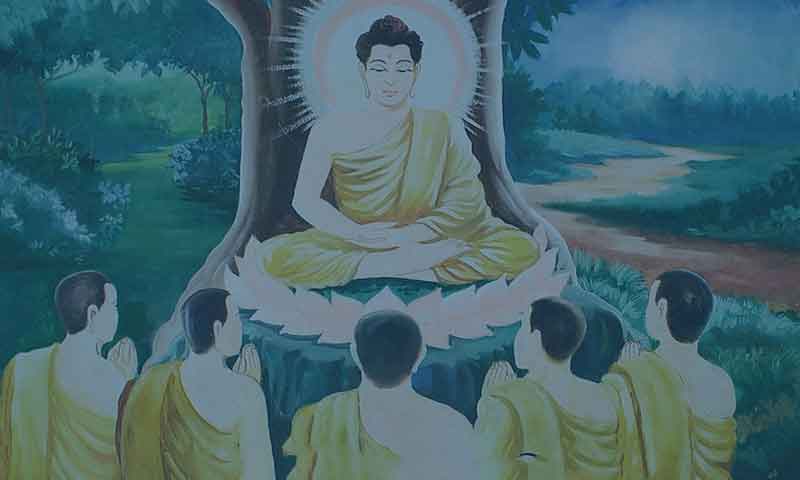
Thus I Have Heard Once

Buddha Teaching the Bhikkhus
The original teachings of the Buddha, which are available to us as Sutras, begin with this phrase, "Thus I have heard once." Sometimes the world 'once' appears in the same expression, or separately in the next sentence.
The Buddha himself laid down this rule to distinguish his teachings from those of others. In doing so he not only ensured the preservation of his teachings but also indirectly elevated them to the status of Sruti (the heard ones) by which the Vedas are known in Hinduism.
In Hinduism, the Srutis are used to clear any confusion or doubt one may have about a particular teaching or belief by validating it against the knowledge found in the Vedas. In Buddhism, the teachings of the Buddha serve the same purpose.
The four words, "Thus-I have-heard-once," are usually followed by a reference to the Buddha, the place where the lecture or the teaching was originally made and the people who attended the teaching. These two and the four words together represent the six requirements that are necessary to teach or speak about the Sutras, or the sayings of the Buddha.
The six requirements are belief, hearing, time, host, place, and audience. They are represented as stated below.
1. The word 'thus' refers to belief.
2. 'Heard' refers to hearing.
3. 'Once' refers to the time.
4. 'Buddha' refers to the host.
5. The place name (such as Sravasti, Jetavana) refers to the place where the teaching was made.
6. The name of the audience (Bhikkhus, Brahmanas, king, etc.), refers to the audience.
The expression, "Thus I have heard once," is meant to inculcate reverence and respect for the knowledge among the followers and to establish the original source of the teaching. The Buddha did not expect his followers to follow him blindly. He wanted them to listen to him, but learn from their own understanding, experience and observation.
Suggestions for Further Reading
- Buddhism - The Concept of Anatta or No Self
- Anatta or Anatma in Buddhism
- Anicca or Anitya in Buddhism
- The Buddha on God
- The Buddha on Avijja or Ignorance and on the Origin of Life
- The Eightfold Path Of Buddhism
- The Four Noble Truths of Buddhism
- Buddhism - Right Living On The Eightfold Path
- Handbook for the Relief of Suffering by Ajaan Lee
- Meat Eating or Vegetarianism in Buddhism
- The Agendas of Mindfulness
- Meditation on Anicca or Impermanence in Buddhism
- A Sketch of the Buddha's Life
- What is Ignorance And Cessation Of Ignorance
- The Meaning of the Buddha's Awakening
- Basic Breath Meditation Practice
- Buddha's Teachings on Kamma or Karma
- Affinities Of Buddhism And Christianity
- Death and Dying in Buddhism
- Buddhism In A Nutshell
- The Buddha on Ignorance or Avijja
- Dhamma for Everyone by Ajaan Lee Dhammadharo
- Advaita Vedanta and Buddhism
- Four Discourses of the Buddha on Everyman's Ethics
- The Five Aggregates A Study Guide
- The Healing Power of the Five Buddhist Percepts
- The Working of Maya or Illusion - A Buddhist Perspective
- Buddhism - Kamma (Karma) and its Fruit
- Buddhism - Kamma (Karma) A Study Guide
- Buddhism - Living the Dhamma A Practice Guide
- What Anatta or No-Self is All About
- Buddhism - The Middle Way
- The Buddhist Monastic Code, Dhamma-Vinaya
- Nibbana, or Nivranva in Buddhsim
- Why The Buddha Taught the Anatta or Not-Self Doctrine
- The Status of Women in Buddhist Societies
- Buddhism - The Practice of Loving-Kindness (Metta)
- Buddhism - Does Rebirth Make Sense
- Buddhism - Right Concentration
- Buddhism - Intentions and Nirvana
- The Round of Rebirth - Samsara
- The Role of Samavega in Buddhism
- The Chaos Theory and Nirvana in Buddhism
- A Christian's Journey Into Buddhism
- A Simple Guide to Buddhism
- Buddhist Cosmology - The Thirty one Realms of Existence
- Buddhism and the concept of renunciation
- Sankharas (Samskaras) in Buddhism
- Vedanta and Buddhism A Comparative Study
- Buddhism - Vipansana or Insight Meditation
- The Right Approach To End Suffering in Buddhismm
- Essays On Dharma
- Esoteric Mystic Hinduism
- Introduction to Hinduism
- Hindu Way of Life
- Essays On Karma
- Hindu Rites and Rituals
- The Origin of The Sanskrit Language
- Symbolism in Hinduism
- Essays on The Upanishads
- Concepts of Hinduism
- Essays on Atman
- Hindu Festivals
- Spiritual Practice
- Right Living
- Yoga of Sorrow
- Happiness
- Mental Health
- Concepts of Buddhism
- General Essays